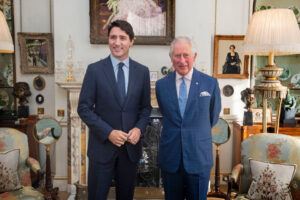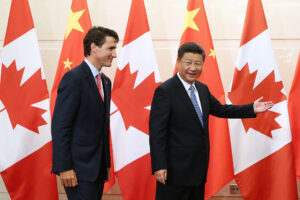In February 1984, Pierre Elliott Trudeau took a legendary walk in the bitter Ottawa cold: there, he decided that he had accomplished all he could and announced his resignation. “To take a walk in the snow” has since become an expression in Canada to signify the solemn contemplative process by which a leader realises that their time is up. His son, Justin, who has just announced his resignation after nine years in power, did not so much take a walk in the snow as be dragged through it, kicking and wailing, by his own MPs. They had finally risen up after months of plummeting poll numbers, one regional caucus after another declaring their wish to see him go.
But how could such a figure — whose ultimate mediocrity has been laid bare — have risen so far? And how is it he came to define a whole decade in the nation’s history? Justin Trudeau had always been Canada’s Dauphin, “the Prince” — indeed, it is the title of a popular biography. But another title from the ancien régime better illustrates what he really was: “the Sun King”, who ruled through spectacle, artifice and celebrity, and who by these means was able to cover up the dire mounting contradictions not just of Canada’s Liberal Party, but of liberalism itself.
The once hegemonic ideology of the West was in the elder Trudeau’s words “not a programme… but an approach to politics”, and it arguably found its fullest expression in his son’s Canada. Humbled in the US and Europe after 2016, liberalism seemed, at least for a time, not just to be alive but thriving in the north. This was for the transatlantic establishment a necessary illusion: Canada as their “Hall of Mirrors”, a consolation and reassurance that their creed still had a fighting chance in a hostile world turned against them. Yet as with the Bourbons and their gilded splendour, Trudeau fell under his own spell, and Canadians paid the price. The story of his reign is thus that of the collision between appearance and substance — and myths, no matter how lofty and intoxicating, can never subdue reality.
Trudeau’s political journey began in October 2000, when he delivered the eulogy at his father’s funeral, a moving speech that caused many to see “the first manifestation of a dynasty”. After an aimless youth spent camping and cavorting, and stints as a drama teacher and ski instructor, he entered parliament in 2008. When the Liberals imploded in the 2011 election, under the academic Michael Ignatieff, the party seemed to overcorrect by finding a replacement who wouldn’t be too bothered by such things as policy ideas or governing philosophies: so, they turned to their one MP who had a pleasing face, great hair, and above all, a storied name.
As Britain and the United States were hurtling toward Brexit and Donald Trump, Trudeau’s ascent in 2015 provided the progressive counterpoint. Such was the frenzied adoration, dubbed “Trudeaumania 2.0”, that the newly elected Prime Minister could cause a global stir just by uttering breezy, feel-good phrases like “Because it’s 2015!” The Economist claimed that “Liberty moved north” while Rolling Stone asked “Why can’t he be our president?”
Yet underneath the glitz, Trudeau did at first assemble a promising team of ministers, including the woman who would be his most loyal advisor Chrystia Freeland, a Rhodes Scholar who wrote a bestselling book on inequality. Trudeau’s government sought to tackle the erosion of middle-class economic security after decades of globalisation. It would do this through an unorthodox programme of moderate stimulus spending and industrial policy, a course that could demonstrate how a renewed liberalism might respond to populist grievances about a hollowed-out economy through domestic reinvestment. At least this was an approximation of the plan in theory.
This incarnation of Trudeau — in stark contrast with what would come up later — had also been conscious of how mass low-skill immigration was affecting Canadian workers, as evidenced by a remarkable 2014 Toronto Star op-ed in which he made the case for far-reaching controls on temporary workers (a warning that he himself would ignore).
Trudeau’s first term saw modest successes, such as the Canada Child Benefit, which sent child support payments to families and lowered the child poverty rate, and Canada’s part in the renegotiation of NAFTA, in which Freeland’s trade delegation narrowly avoided the threat of economic “ruination” promised by Trump.
But the seeds of his impending collapse in popularity were already being planted at this time by the callous inattention he paid to Canada’s youth, who more than anyone elevated him to victory. Though the PM seemed to say all the right things about the need to build affordable housing, his actual policies amounted to tacit affirmations of the Nimby-ist status quo, which favoured home-owning older Canadians, reliant on the ever-appreciating value of their real estate.
In the past, the partisans of liberalism had always been able to present themselves and their ideas as the wave of the future, as heralds of growth and abundance: yet here was the liberal tribune Trudeau doing the opposite, taking the side of the elderly over the young, of virtual stagnation over material progress. Furthermore, his government proved incapable of carrying out its own ambitious industrial policy, producing an infrastructure bank and “innovation cluster programme” whose projects no one can still identify. He also hamstrung Canada’s vast energy wealth, needed to power any future industrial revival, with excessive environmental regulations.
A series of damaging ethical scandals and ugly political reprisals led to a reduced minority government in the 2019 election (the infamous “blackface campaign”), a setback from which the Trudeau Liberals would never recover. “At least he legalised pot!” as Canadians who now regret voting for him like to say — in reference to the one pledge that they can remember him keeping.
Then, in early 2020, came Covid-19, which threw into relief the tensions between individual liberty and collective security. And though the Trudeau government’s handling of the pandemic has since become a subject of heated polemic, the fact is that the first year and a half of the lockdown era proved to be largely uneventful. In fact, Ottawa’s relatively rapid acquisition and distribution of vaccines boosted the government’s popularity enough that the PM felt bold enough to call an early election in September 2021.
After this would come a grave challenge to his rule: the anti-mandate “Freedom Convoy” was not widely popular, when all was said and done. Canadians are, after all, an anti-revolutionary people (“peace, order, and good government” is the national motto). The convoy’s strength, however, was in playing the same elaborate game of spectacle that Trudeau excelled at and then throwing the gauntlet back at his feet. Despite shaky national support for their cause at best, convoy leaders managed to present the impression of a people’s uprising by swarming the capital so dramatically with trucks and inviting supporters to join them, gaining the attention of the wider world and focusing attention on Trudeau’s faltering early response. In any event, even some of those who disagreed with the convoy’s actions and tactics also disagreed with his invocation of the Emergencies Act to disperse the convoy, seen as heavy-handed, if not outright tyrannical. This touchy-feely image, which had been a cornerstone of his initial celebrity, and his claim to leadership of the liberal world had been greatly diminished.
The convoy was defeated but its lasting impact was in toppling the Conservative Party leadership and replacing it with Pierre Poilievre, a man diametrically opposed to everything Trudeau stands for and who now intends to roll back nearly all of his policy legacy.
The rest of Trudeau’s rule from that point on was one long, drawn-out process of unravelling which can be described as “a political slow heat death”. In his final three years, Trudeau managed to annihilate the integrity of Canada’s immigration system, which had previously been a point of pride and consensus while presiding over a housing crisis without end, and to leave his party and country in tatters, as it emerges from this crisis woefully unprepared to meet the existential challenge of the Trump Administration’s tariffs. But perhaps most tragically of all, he had betrayed the trust once reposed in him by Canada’s youth, whose very ability to hope for a brighter future has been seriously damaged.
In the end, it was his own lieutenant Freeland who decided to throw the Sun King from his throne, ending the reign of liberal illusion and setting the stage for the post-Trudeau era. It was said that Louis XIV danced in radiant golden shoes as he seized power from the nobles: Canada’s monarch, too, managed to distract the world with colourful footwear. If only we, the citizens of Canada, had been courageous enough to say to him sooner and with a stronger voice, as the Australian Prime Minister once did: “Justin, we’re not here to talk about your socks.”
Disclaimer
Some of the posts we share are controversial and we do not necessarily agree with them in the whole extend. Sometimes we agree with the content or part of it but we do not agree with the narration or language. Nevertheless we find them somehow interesting, valuable and/or informative or we share them, because we strongly believe in freedom of speech, free press and journalism. We strongly encourage you to have a critical approach to all the content, do your own research and analysis to build your own opinion.
We would be glad to have your feedback.
Source: UnHerd Read the original article here: https://unherd.com/



